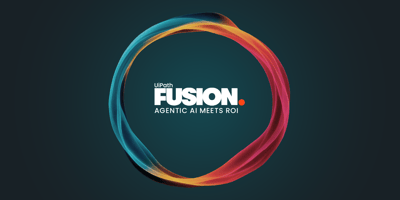Automation’s second act: the agentic imperative
Share at:

At last week’s UiPath Agentic Automation Launch event, our CEO and founder Daniel Dines launched a new era for UiPath. He revealed how we’ve built the foundation to become the first enterprise-grade platform for trusted agentic automation. He explained how decades of automation and AI leadership have brought us here, and where the future of human-agent-robot collaboration will take us.
It’s clear that AI agents—intelligent, AI-based entities able to work independently and on behalf of people—will have a huge impact on businesses and society. By 2028, Gartner predicts they'll be included in 33% of enterprise applications. At least 15% of day-to-day decisions will soon be made by AI agents.
In this blog, I’ll elaborate on some of Daniel’s points, exploring the trends driving businesses to embrace these AI agents and embed them in their most critical processes. I’ll also share the impact agentic automation is already having on many market leaders, and how other enterprises can rapidly capture that same value.
What’s driving the agentic revolution?
The business world is becoming increasingly complex, with enterprises relying on an extensive array of applications and systems to execute their processes. It's estimated that a typical enterprise utilizes more than 175 different applications and systems, presenting significant challenges in coordination, data management, and operational efficiency:
Process optimization complexity: organizations struggle to optimize workflows across interconnected systems.
Digital transformation roadblocks: legacy systems and fragmented processes often hinder tangible transformation results.
Inefficiency and manual work: redundant, manual tasks persist, hindering overall productivity.
Competing objectives: businesses must simultaneously improve efficiency, enhance customer experience, and boost employee productivity.
Moreover, when it comes to AI implementation, businesses face additional hurdles:
Implementation hesitation: there's uncertainty around where and how to apply AI for measurable business value. UiPath research also shows that deployment costs are a real concern, with 37% of U.S. IT leaders calling the cost of implementation a key AI challenge.
Endless PoCs: many organizations remain trapped in pilot phases, never achieving scaled impact.
Vendor lock-in fears: while enterprises can tap into multiple model and agent providers, many still feel constrained by legacy platforms—walled gardens that limit flexibility, scalability, and real return on investment.
Skill gaps: the talent needed to build, manage, and monitor AI agents is scarce and expensive to maintain.
Security and compliance: integrating AI without compromising regulatory standards or cybersecurity is complex. More than half (56%) of IT leaders cite security issues as a key AI challenge.
Enter agentic automation—an advanced strategy in intelligent enterprise automation that combines advanced AI agents, traditional automation, and human decision-making capabilities. This paradigm shift enables businesses to automate complex, unstructured workflows and infuses dynamic intelligence into automation processes.
The business value of agentic automation
As Daniel Dines explains: "Robots gave us technology to emulate how people do repetitive work. With agentic automation, this is the first time in history we have access to technology that starts to truly emulate the human mind."
Adopting this new paradigm and approach offers the enterprise a range of benefits:
Operational efficiency and productivity: by effectively distributing tasks among people, robots, and AI agents, organizations can accelerate turnaround times and improve productivity.
Accuracy, consistency, and cost efficiency: agentic automation minimizes potential human error, promoting consistency and higher precision in both repetitive and complex tasks.
Scalability and adaptability: with its modular design and continuous learning abilities, agentic automation provides a highly adaptable and scalable solution that caters to dynamic workloads and changing business needs.
Empowered workforce and collaborative decision making: by freeing people from routine tasks, agentic automation fosters focus on strategic, creative, and customer-centric tasks.
Enhanced stakeholder experience: intelligent data processing aids in making informed decisions, while faster response times and improved accuracy enhance customer satisfaction.
Agentic automation: real-world applications
So, how does agentic automation work in practice? Imagine a typical mortgage application process. Through agentic automation, AI agents could analyze applicant data and make initial recommendations, robots could handle document processing and data entry, while people focus on more complex cases and final approvals. This seamless collaboration can dramatically reduce processing times, improve accuracy, and enhance the client experience.
Or consider a customer service scenario where AI agents handle initial inquiries, accessing vast knowledge bases in seconds to provide accurate responses. Complex issues could be seamlessly escalated to employees, who would have all the relevant information at their fingertips, thanks to the AI agent’s analysis.
What are businesses saying?
The enthusiasm from UiPath customers for agentic automation speaks volumes about its potential to create unique business value. Organizations across various industries are recognizing the need for agentic automation to scale their capabilities faster and maximize the value of their employees:
"Leveraging agentic automation in our UiPath integration is providing massive ROIs. Exploring applications in sales and customer service is proving especially promising. These automated agents carry out the heavy lifting, allowing our sales team to focus on driving revenue. Similarly, deploying AI in customer service has measurable impacts, including substantial time savings and shorter code cycles." Akash Rana, Senior Manager IT Digital Automation, Regal Rexnord
"Agentic automation is certainly on our agenda for facilitating two key use cases—device processing and medical summarization. With agentic automation, we can potentially enhance our device processing capabilities. Similarly, we intend to use agentic automation to efficiently manage extensive medical records via summarization." Satyendra Satendra Shukla, Vice President, Payer Configuration & Intelligent Automation, CareSource
"We have a lot of complex processes like accounts payable, where we've only been able to automate parts of it. Those automations do well, but they don't span the process from one end to the other. Now with agentic automation and agentic orchestration, we can automate the entire process, end to end." Chris Engel, Automation Center of Excellence – Global Discovery Lead, Johnson Controls Inc.
"It's about strategically pairing human capacities with agentic capabilities to maximize value for our customers. Contrary to the assumption that agents will take over completely, they'll instead handle repetitive daily tasks, transforming our approach to customer service in the future." Manuel Delgado, Chief Operating Officer, Banco Azteca
From enhancing decision-making processes and streamlining customer service to optimizing complex financial operations and managing medical records, agentic automation is proving to be a game-changer.
For more on how UiPath customers are driving transformative value with agentic automation, check out the latest blog from our Head of Global Customer Advocacy Janette Hausler.
The path forward: think big, act small
As exciting as this new era is, we understand that adopting agentic automation requires careful consideration and strategic implementation. We recommend a phased approach that’s driven by measured impact and proven performance:
Assess the suitability of agentic automation for your enterprise tasks.
Identify specific workflows where it can yield substantial results.
Engage with agentic automation experts for assistance in adoption and integration.
Deploy through a phased approach.
Continuously monitor and optimize performance.
The second act for business and automation
Agentic AI is automation's second act. It empowers organizations to bring human-like intelligence into automation. To safely and responsibly build, operate, and realize transformational value from the latest of what AI can offer.
Agentic automation also represents a second act for all enterprises. It will empower them to tackle complex challenges that were previously insurmountable. It will enable organizations to be more responsive to market changes, more attuned to customer needs, and more efficient in their operations.
So, embarking on the path to agentic automation isn’t a strategic decision; it's an imperative. Watch our launch event on demand to see how UiPath provides the full infrastructure to support the future of agentic automation.

Vice President, Product Marketing, UiPath
Get articles from automation experts in your inbox
SubscribeGet articles from automation experts in your inbox
Sign up today and we'll email you the newest articles every week.
Thank you for subscribing!
Thank you for subscribing! Each week, we'll send the best automation blog posts straight to your inbox.



